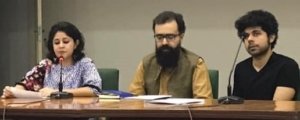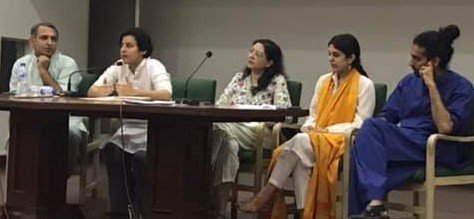 A number of academics from public and private educational institutes of the city have set up a forum for protection of academic freedom and articulate progressive interventions based on scholarly research.
A number of academics from public and private educational institutes of the city have set up a forum for protection of academic freedom and articulate progressive interventions based on scholarly research.
This was announced during a discussion on the crises of Pakistani universities and mapping a progressive future at the Human Rights Commission of Pakistan (HRCP) office in Lahore on Sunday.
Prof Ali Usman Qasmi from Lahore University of Management Sciences (LUMS) described the reason behind forming the Progressive Academic’s Collective (PAC). Prof Nida Kirmani also from LUMS, Prof Ammar Jan from Forman Christian (FC) College, Sarah Suhail from Information Technology University (ITU), Punjab Professors and Lecturers Association (PPLA) vice-president Faiza Rana, Dr Tania Saeed from LUMS, Haider Shahbaz from FC College and others discussed the issues of academic staffs’ struggles and exclusion on campuses.
The participants discussed the problems being faced by the academics in the country especially 50pc proposed cut in the Higher Education Commission (HEC) funds, rising religious extremism, widening income gaps, environmental degradation and decline in industrial productivity.
They said a new generation of academics is working in the educational institutions and it’s time to promote critical thinking among the students and academics. They said they would launch campaign to confront the challenges and propose to set up a forum for academics engaged in research and teaching at public and private sector universities.
The forum would serve as a collective space for academics to voice their expert opinion on various aspects of Pakistan’s polity, economy and society and to mobilise in support of progressive values within the higher education sector. They said they would seek to transform universities as sites of critical debate and discussion in order to offer incisive critiques of embedded structures of power. This would invariably benefit the student community as an active university space would create a conducive environment for learning.
The objectives of forming a forum include supporting the constitutional right to education to attain higher education, ensure equality by holding educational institutions accountable for equal access and free speech, stand with the struggles of groups marginalised by their gender, ethnic, religious, sexual or economic status or identity, oppose securitisation and surveillance on campuses, promote democratisation including freedom of speech, thought and expression, and transparency and accountability, shared governance and autonomy.
The objectives further include ensuring free safe space and oppose violence including coercion, harassment in all forms (including sexual) and bullying on campus besides ensuring security of employment, fair working conditions, social security, health cover and other benefits for faculty and staff, and advocating increase in budgetary allocation for higher education in developing libraries.
“Such platforms are necessary to resist the ongoing war on higher education in our country. Along with students and parents, teachers will soon launch a mass campaign to defend and reform education system,” commented Dr Ammar Jan seeking help of all progressive forces, academics and students in this crucial fight.
They spoke about the importance of academic freedom and the need to create safe and inclusive campuses in the face of increasing surveillance and drastic budgetary cuts.
After 50 per cent budget cuts for the HEC, the government is planning to drop another financial bomb on ordinary citizens, he cautioned. The Punjab government is contemplating an act (The Medical Teaching Institutes Act) which seeks to privatise the medical services offered by medical teaching institutes. This means the doctors, paramedics and health workers associated with these institutes will no longer remain government employees (and hence can be fired at whim), he feared. Moreover, no guaranteed free medical services (such as free tests) would be available to the public.
We believe that it is the right time for teachers, students and society in large to question whether the youth of this country is being equipped to face the challenges of our time, they said.
This move comes in after the exorbitant increase in medicine prices earlier this year. Abdul Hafeez Sheikh has been brought in by the IMF to squeeze an already impoverished public. The cuts in funding for health and education are happening at a time when no credible plan has been offered to make the elites pay their fair share of taxes. And that is because people like Hafeez Sheikh are answerable to no one but the elites who have put them in power.
The case for a mass campaign to defend education and public health is becoming stronger by the day. Only popular resistance can stem the perpetual erosion of the basic social protections guaranteed by our constitution, Jan said.
Abdul Wadood in a post on his Facebook page said the medical teaching institute act has already been experimented in KP and it has badly failed. Now PTI govt in KP is trying to implement the same system under the name of regional and district health authorities in the peripheries of KP. This mass privatisation and ad-hocism is neither in favour of patients nor doctors. We have already witnessed it in the form MTI act. All doctors are on strikes against these so called reforms.

